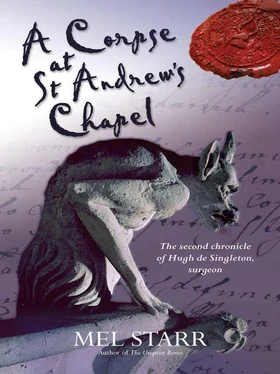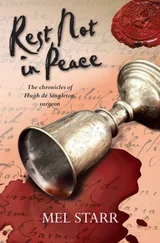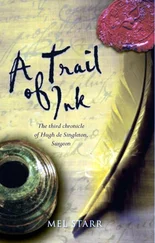Mel Starr - A Corpse at St Andrew's Chapel
Здесь есть возможность читать онлайн «Mel Starr - A Corpse at St Andrew's Chapel» весь текст электронной книги совершенно бесплатно (целиком полную версию без сокращений). В некоторых случаях можно слушать аудио, скачать через торрент в формате fb2 и присутствует краткое содержание. Год выпуска: 2010, Издательство: Kregel Publications, Жанр: Исторический детектив, на английском языке. Описание произведения, (предисловие) а так же отзывы посетителей доступны на портале библиотеки ЛибКат.
- Название:A Corpse at St Andrew's Chapel
- Автор:
- Издательство:Kregel Publications
- Жанр:
- Год:2010
- ISBN:нет данных
- Рейтинг книги:5 / 5. Голосов: 1
-
Избранное:Добавить в избранное
- Отзывы:
-
Ваша оценка:
- 100
- 1
- 2
- 3
- 4
- 5
A Corpse at St Andrew's Chapel: краткое содержание, описание и аннотация
Предлагаем к чтению аннотацию, описание, краткое содержание или предисловие (зависит от того, что написал сам автор книги «A Corpse at St Andrew's Chapel»). Если вы не нашли необходимую информацию о книге — напишите в комментариях, мы постараемся отыскать её.
A Corpse at St Andrew's Chapel — читать онлайн бесплатно полную книгу (весь текст) целиком
Ниже представлен текст книги, разбитый по страницам. Система сохранения места последней прочитанной страницы, позволяет с удобством читать онлайн бесплатно книгу «A Corpse at St Andrew's Chapel», без необходимости каждый раз заново искать на чём Вы остановились. Поставьте закладку, и сможете в любой момент перейти на страницу, на которой закончили чтение.
Интервал:
Закладка:
“Don’t know,” the woman shrugged and chewed on her lower lip. “Din’t know as ’e did.”
“You did not see him draw them?”
“Nay.”
The woman said no more. I apologized for disturbing her dinner and made my way back to the castle in time for my own meal.
My thoughts were not on the castle cook’s culinary creations that day. I puzzled over the wood and nails as I ate. Perhaps, I thought, the tool served for dealing with animals in some new way. The blood — or what I took to be blood — seemed to point to such a use. But John Holcutt, whose duties with demesne livestock made him knowledgeable of all instruments needful for working with beasts, recognized no purpose for this thing.
I was near to giving up study of the strange tool, knocking the nails from it, and forgetting the puzzle. But in my chamber after dinner I examined the thing again.
My previous study had concentrated on the nails. It seemed to me that whatever this tool was designed to accomplish, it was the nails which were to do the work. The wooden block served but to hold them in place, and as a handle.
I have told of the size of the piece. As I examined it again I noticed that the block was not symmetrically shaped. The block was slightly narrower at one end than at the other, and the sides were beveled. I recognized then what it was and berated myself for my lack of imagination. I set off immediately for the town and the Broad Street where I might find Ralph the cooper.
He was at his vise, drawknife in hand, shaping a stave. He stood in a pile of sweet-smelling shavings which, as at the new tithe barn, helped obscure the fact that their maker was overdue for his spring bath.
The cooper looked up from his work, recognized me, and smiled. As well he might, for my previous business with him had always involved a purchase for the castle storeroom or buttery. He saw a lucrative sale in his future.
Then his eyes fell to the wooden block and its captive nails and the grin on his face melted like butter in July. Here, I thought, may be found another mystery.
“Good day, Ralph,” I smiled broadly. I wished the fellow at ease; I thought I might learn more from him than if he was anxious. And from his new-fallen countenance I felt certain he had some reason for worry. And it had to do with the block.
“I have a tool here which no man can explain.”
The cooper’s eyes darted from my face to my outstretched hand and back again.
“Henry atte Bridge, who was struck down in the forest, you may remember, made this. See how the wood is shaped like a length of barrel stave.” I handed the piece to Ralph, who took it gingerly, as if the nails were yet hot from Edmund’s forge.
“How long ago,” I asked, “did Henry come to you seeking wood?”
I might have asked if Henry had sought wood of him, but then the cooper might deny the source and I might never get the answer I needed. Better he thought I knew the origin of the block for a certainty.
“’Twas but a scrap,” Ralph offered. “A stave was split an’ discarded. Henry asked for a piece.”
“Beech, is it not?”
“Aye.”
“Did Henry say his purpose? Did he show you the nails as they are now?”
“Nay…’e had no nails. Just asked for the wood.”
“Did you ask a price?”
“Nay. ’Twas no good to me but for the fire. I cut off a hand’s length an’ Henry were satisfied.”
“When did he ask for this?”
The cooper made much of his struggle to remember. His brow looked like a new-plowed field and he scratched at his chin.
“Weeks ago now, ’twas.”
“How many weeks?”
“Before Easter. Aye…before Easter ’twas.”
“How long before?” I pressed.
“A week, p’rhaps more. Aye, ’bout a week.”
“And he carried the wood away without telling of his need, or driving nails through it in your sight?”
“Aye. That’s ’ow ’twas, Master Hugh.”
The cooper wished fervently for me to believe this. But did he desire this because the tale was true, or because it was false? A man might wish to be believed for either reason. And why should it matter to him whether I believed him or not? I was inclined to believe the man, and as it came to pass, the tale was true.
I studied the man and chewed my lip, trying to invent some other questions which might illuminate the purpose for the block and nails. Ralph saw this, and said, “’E come back day before Easter.”
“Saturday?
“Aye. Said I was to tell none of ’is need an’ the wood I gave ’im.”
“He did not say why?”
“No. With Henry like as ’e could be, I din’t ask. But ’e din’t want any to know of it, I think. Couldn’t figure why. Do you know why?”
“This is why you seemed distressed when I came to you today with the block?”
“Aye. Don’t know as what Henry wanted with it, but seems to me ’twas to no good…or why’d ’e care who knew of ’im ’avin’ it?”
I walked the castle parapet again that night, twirling the piece of stave and nails as I did. I felt certain now I knew its use. But I could not prove it. And I did not know why it was used as it was. I did know that I was deep into a mystery which included much I did not know. I resolved then to keep a record of these events, so as to order all things in my mind, and as a register should I in the future decide to write a chronicle of this affair.
There was an obstacle to this decision. I had in my chamber but six sheets of parchment and a pot of ink nearly dry. If I was to put my thoughts to parchment I must travel to Oxford to renew my supply. A journey to Oxford through the spring countryside seemed a pleasant distraction and, perhaps while swaying along on Bruce’s broad back at his stolid pace, some new notion explaining events since Easter might occur to me.
Chapter 10
I planted my feet on the cold flags of my chamber as soon as dawn lightened my window. The cook was surprised to see me, as I am not usually early from my bed. There was a warm wheaten loaf fresh from the oven, and cheese and ale, for my breakfast.
I searched out John Holcutt while the marshalsea prepared Bruce, and told him of my journey. He would serve as Lord Gilbert’s agent in my absence, which I planned to take but two days. A trip to Oxford and back might be completed in one day, on a younger horse, by a competent rider, who did not mind arriving home after dark. But Bruce was aged, and my skills at horsemanship are meager, and I remembered clearly the last time I rode at night alone. And there was more I wished to do in Oxford than purchase ink and parchment.
There is much profit in a springtime journey to Oxford. It was indeed a pleasant occupation to observe the countryside as Bruce ambled upon his way. Villagers were mostly at work in their tofts, as by this day in May the fields were all plowed and sown.
Birds darted from meadow to forest, completing nests. Even the oaks, last of the trees to achieve full foliage, seemed sure enough of the season to bring forth leaves.
The journey brought me nearer to Oxford, but no nearer to assembling the events of the past months into some coherent pattern. I gave up the attempt and turned myself to observing the approaching town as Bruce’s great hooves clattered across the Oxpen’s Road Bridge.
Some of my most agreeable memories involve Oxford. But some unpleasant memories of the place are yet green in my mind as well. The St Scholastica Day Riot, of which I took no part, but which drove me and many other students from the town, remains vivid in my mind’s eye. And as Bruce ambled past the castle and the old keep I thought back to the testimony I gave there before the king’s eyre which came near to sending an innocent man to the gallows. It is, perhaps, good to remember our errors. But perhaps not. Men seem to repeat their mistakes with some frequency. Is it forgetfulness or foolishness which is to blame?
Читать дальшеИнтервал:
Закладка:
Похожие книги на «A Corpse at St Andrew's Chapel»
Представляем Вашему вниманию похожие книги на «A Corpse at St Andrew's Chapel» списком для выбора. Мы отобрали схожую по названию и смыслу литературу в надежде предоставить читателям больше вариантов отыскать новые, интересные, ещё непрочитанные произведения.
Обсуждение, отзывы о книге «A Corpse at St Andrew's Chapel» и просто собственные мнения читателей. Оставьте ваши комментарии, напишите, что Вы думаете о произведении, его смысле или главных героях. Укажите что конкретно понравилось, а что нет, и почему Вы так считаете.












